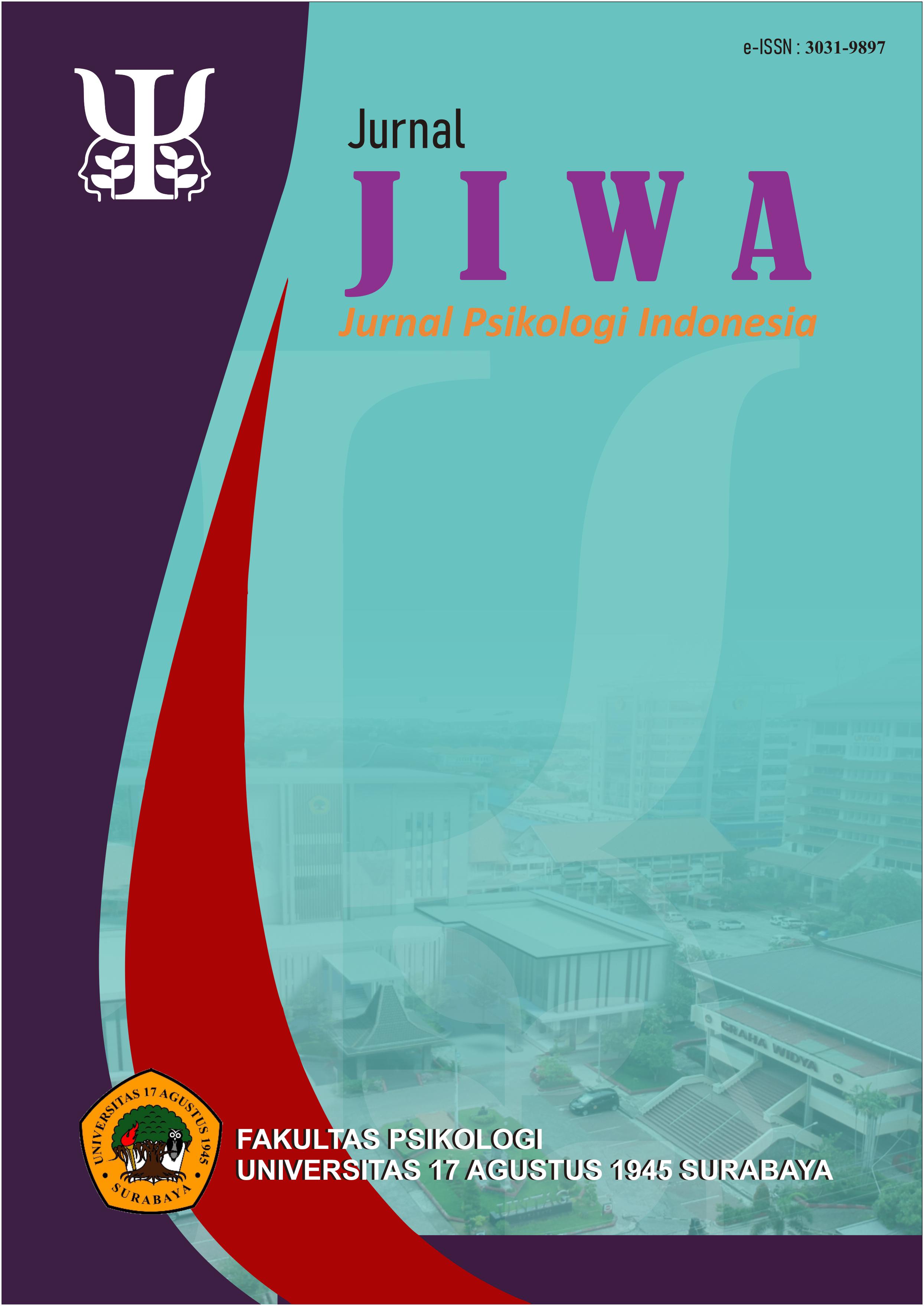Kontrol Diri dan Prokratinasi Akademik: Pengguna Game Online
DOI:
https://doi.org/10.30996/jiwa.v2i1.10380Keywords:
Kontrol Diri, Prokrastinasi Akademik, Remaja, Pengguna Gme OnlineAbstract
Abstract
The aim of this research is to determine the relationship between self-control and academic procrastination in adolescent online game users. This research uses quantitative research methods. The population in this research were teenagers aged 16-18 years in Sukolilo sub-district, Surabaya. The population size in this study is unknown. So this research uses the lemeshow formula to determine the sample. From the calculation results, the Lemeshow formula was obtained, namely 100 samples. The sampling technique used Accidental Sampling with samples obtained from 100 participants. The data analysis method used in this research is the Spreman Rho correlation technique. Based on the results of data calculations using the Sperm Rho correlation technique between self-control and academic procrastination, a correlation score of -0.432 was obtained with a significance of 0.000 (<0.05). The existence of a negative relationship between the two variables indicates that there is a relationship between the control variable and academic procrastination. The results of this study illustrate that the higher the adolescent's self-control, the lower the academic procrastination, the lower the adolescent's self-control, the higher the academic procrastination.
Abstrak
Tujuan dari penelitian ini adalah untuk mengetahui hubungan antara kontrol diri dengan prokrastinasi akademik pada remaja pengguna game online. Penelitian ini menggunakan metode penelitian kuantitatif. Populasi dalam penilitian ini adalah remaja umur 16-18 di Kecamatan Sukolilo, Surabaya. Adapun jumlah populasi di penelitian ini tidak diketahui. Maka penelitian ini menggunakan rumus lemeshow untuk menentukan sampel. Dari hasil perhitungan yang diperoleh rumus lemeshow yaitu sebanyak 100 sampel. Teknik pengambilan sampel menggunakan accidental sampling dengan sampel yang didapat 100 partisipan. Metode analisis data yang digunakan dalam penelitian ini adalah teknik korelasi Spearman Rho. Berdasarkan hasil perhitungan data menggunakan teknik korelasi Spearman Rho antara kontrol diri dengan prokrastinasi akademik yang diperoleh skor korelasi sebesar -0,432 dengan signifikan 0,000 (<0,05). Adanya hubungan negatif antara dua variabel menunjukkan bahwa adanya hubungan antara variabel kontrol dengan prokrastinasi akademik. hasil penelitian ini menggambarkan semakin tinggi kontrol diri remaja, maka semakin rendah prokrastinasi akademik, semakin rendah kontrol diri remaja, maka semakin tinggi prokrastinasi akademik.
Downloads
References
Chisan, F. K., & Jannah, M. (2021). Hubungan antara kontrol diri dengan prokrastinasi akademik pada siswa Sekolah Menengah Atas. Jurnal Penelitian Psikologi, 8(5), 1-10.
Ferrari, J.R. (2010). Still Procrastinating: The no regrets guide to getting it done. new york: Turner Publishing Company.
Ferrari, J.R. Johnson, J.L. & Mc.Crown, W.G. (1995). Procrastinasi dan task avoidance, theory, research and treathment. New York: Plenum Press
Safiinatunnajah, R., & Fikry, Z. (2021). Hubungan antara kontrol diri dengan prokrastinasi akademik pada siswa pengguna Media Sosial. Jurnal Pendidikan Tambusai, 5(1), 228-332.
Sugiyono. (2013). Metode penelitian pendidikan (Pendekatan Kuantitatif, Kualitatif dan R&D). Bandung: Alfabeta.
Sulistyo, Juandika Tri, Evanytha, dan Vinaya. 2015. “Hubungan Problematic Online Game Use dengan Pola Asuh Pada Remaja”. Jurnal Psikologi Ulayat. Vol. 02 No. 1 pp. 396-406.
Tangney, J.P., Baumeister, R. F. and Boone, A. L. (2004). High self-controlpredicts good adjustment, less pathology, better grades, and interpersonal success. Journal of Personality, 72, 271–324.







